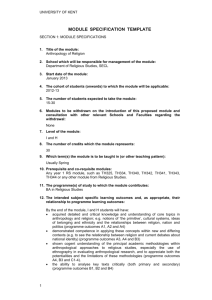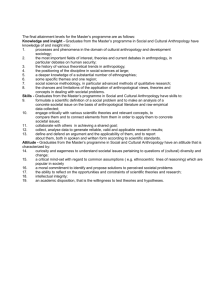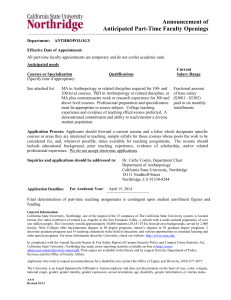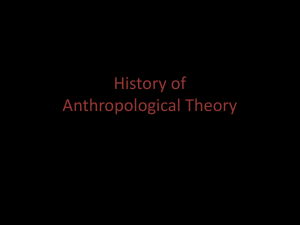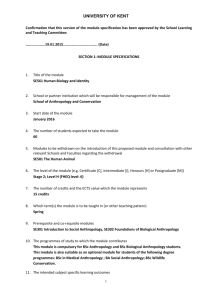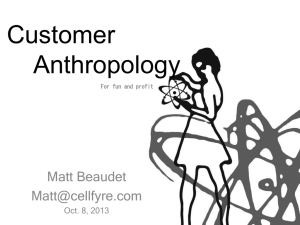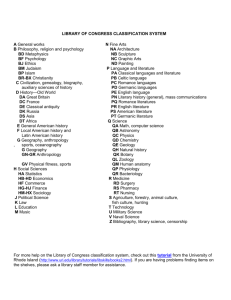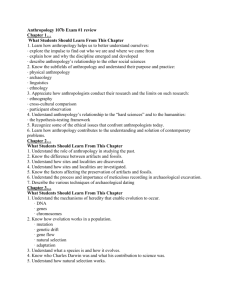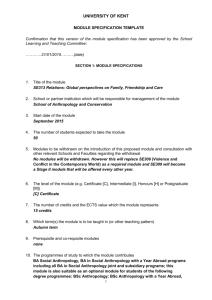UNIVERSITY OF KENT MODULE SPECIFICATION SECTION 1
advertisement
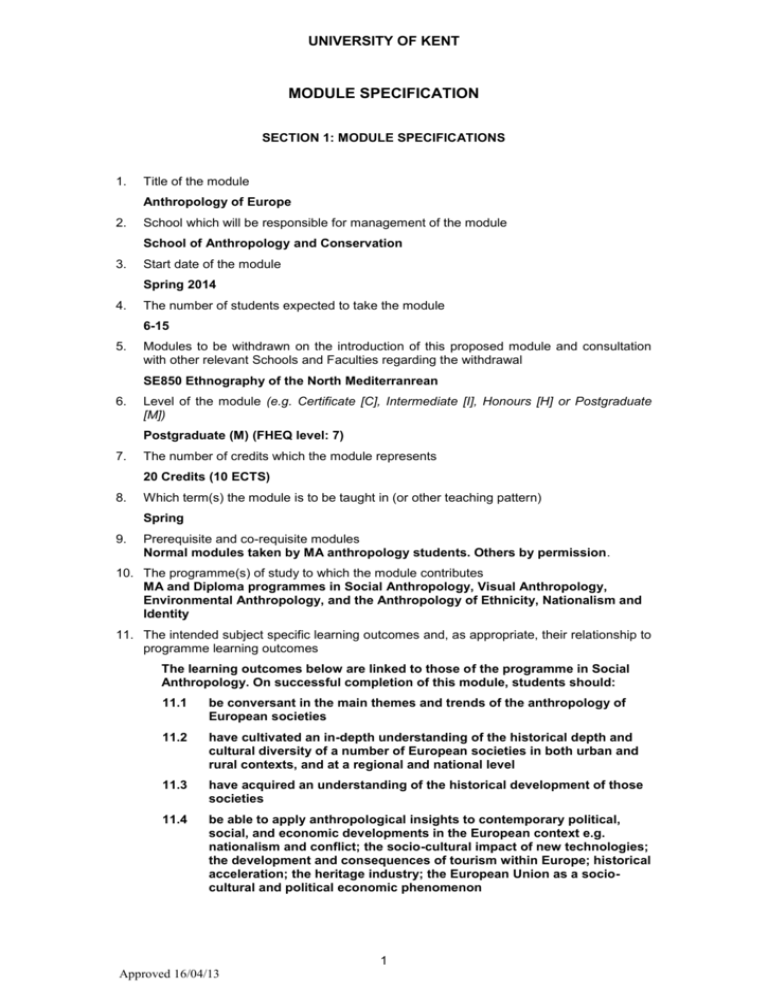
UNIVERSITY OF KENT MODULE SPECIFICATION SECTION 1: MODULE SPECIFICATIONS 1. Title of the module Anthropology of Europe 2. School which will be responsible for management of the module School of Anthropology and Conservation 3. Start date of the module Spring 2014 4. The number of students expected to take the module 6-15 5. Modules to be withdrawn on the introduction of this proposed module and consultation with other relevant Schools and Faculties regarding the withdrawal SE850 Ethnography of the North Mediterranrean 6. Level of the module (e.g. Certificate [C], Intermediate [I], Honours [H] or Postgraduate [M]) Postgraduate (M) (FHEQ level: 7) 7. The number of credits which the module represents 20 Credits (10 ECTS) 8. Which term(s) the module is to be taught in (or other teaching pattern) Spring 9. Prerequisite and co-requisite modules Normal modules taken by MA anthropology students. Others by permission. 10. The programme(s) of study to which the module contributes MA and Diploma programmes in Social Anthropology, Visual Anthropology, Environmental Anthropology, and the Anthropology of Ethnicity, Nationalism and Identity 11. The intended subject specific learning outcomes and, as appropriate, their relationship to programme learning outcomes The learning outcomes below are linked to those of the programme in Social Anthropology. On successful completion of this module, students should: 11.1 be conversant in the main themes and trends of the anthropology of European societies 11.2 have cultivated an in-depth understanding of the historical depth and cultural diversity of a number of European societies in both urban and rural contexts, and at a regional and national level 11.3 have acquired an understanding of the historical development of those societies 11.4 be able to apply anthropological insights to contemporary political, social, and economic developments in the European context e.g. nationalism and conflict; the socio-cultural impact of new technologies; the development and consequences of tourism within Europe; historical acceleration; the heritage industry; the European Union as a sociocultural and political economic phenomenon 1 Approved 16/04/13 UNIVERSITY OF KENT 11.5 understand the impact of study of industrial and post-industrial European societies on anthropological methods 11.6 be knowledgeable about the theoretical contributions of Europeanist anthropologists to the wider discipline 12. The intended generic learning outcomes and, as appropriate, their relationship to programme learning outcomes On completion of this module, students should gain: 12.1 Critical thinking appropriate to the postgraduate level 12.2 Ability to use (and combine effectively) written, oral and visual modes of communication 12.3 Reading, comprehension and assimilation of texts written for a professional audience 12.4 Presentation skills: clarity, professionalism, relevance of material 12.5 Ability to work effectively within a small group 13. A synopsis of the curriculum ‘The Anthropology of Europe’ surveys the social anthropology of contemporary Europe. The module explores changes in European societies since the end of the Cold War, including conflict related to the reorganisation and ‘fortification’ of Europe’s southern and eastern borders. We read ethnographies exemplifying contemporary approaches to studying industrial and post-industrial societies. We critically review key debates in the study of community and identity politics; nationalism and ethnic conflict; borders, migration and transnationalism; tradition, modernity, and heritage; tourism; industrial and post-industrial work; new religious movements; and biosocialities. A further focus is interrogation of the concept of ‘Europe’ itself, through analyzing the process of ‘Europeanization’ within the European Union, and issues raised by the financial crisis; and through presenting ethnographic vantage points from which students can rethink the idea of ‘Europe’ for themselves. The module includes a critical history of anthropological study of Europe and the Northern Mediterranean, with special attention to the role of the University of Kent in the development of the regional literature. 14. Indicative Reading List Asad, T., J. Fernandez, M. Herzfeld, A. Lass, S.R. Rogers, J. Schneider and K. Verdery. ‘Provocations of European Ethnology’, American Anthropologist 99(4):713–30, 1997. Berdahl, D. Where the World Ended: Re-Unification and Identity in the German Borderland. Berkeley: University of California Press, 1999. Davis, J. 1977. People of the Mediterranean: an Essay in Comparative Social Anthropology. London: Routledge. Goddard, V.J., J. Llobera, and C. Shore (eds), 1994. The Anthropology of Europe: Identities and Boundaries in Conflict, Oxford: Berg. Macdonald, S. (ed) 1993. Inside European Identities: Ethnography in Western Europe. Oxford: Berg. Navaro-Yashin, Y. 2012. The Make-Believe Space: Affective Geography in a PostWar Polity. Durham: Duke University Press. Pina-Cabral, J. and J.K. Campbell (eds.) Europe Observed. London: Palgrave MacMillan, 1992. 2 Approved 16/04/13 UNIVERSITY OF KENT Rabinow, P. 1999. French DNA: Trouble in Purgatory, Chicago: University of Chicago Press. Rapport, N. (ed) 2002. British Subjects: An Anthropology of Britain. Oxford: Berg. Shore, C. 2000. Building Europe: The Cultural Politics of European Integration. London: Routledge. Silverstein, P. Algeria in France: Transpolitics, Race, and Nation. Bloomington: Indiana University Press, 2004. 15. Learning and Teaching Methods, including the nature and number of contact hours and the total study hours which will be expected of students, and how these relate to achievement of the intended learning outcomes The teaching structure of the module is 12 x 1-hour lectures + 12 x 1.5-hour seminars + 2 tutorials = 32 contact hours per student. Students will gain through lectures and seminar group discussions the foundations from which to explore the module material in more depth in their individual tutorials, for which they will have at least two. For each hour in lecture, seminar or tutorial, students will be expected to devote 4 hours of independent study or use of online module resources; 16 hours on the short essay; and 24 hours for the long essay; totalling 200 hours’ study and writing devoted to the module including the 32 teaching contact hours. Contact-based learning will be supplemented by resources collected on a Moodle site for the module. The module thus combines structured lecture periods, semistructured seminars, and ample scope for individual exploration of the module’s subject matter, ensuring that achievement of the learning outcomes is a collaborative product of the content and facilitation supplied by the lecturer and the initiative of individual students. . Table of subject and generic learning outcomes supported by these methods: Teaching & Learning Method Subject Learning Outcomes Generic Learning Outcomes Lectures 11.1, 11.2, 11.3 12.1, 12.3, 12.5 Seminars 11.4, 11.5, 11.6 12.2, 12.3, 12.4, 12.5, 12.6 Student-lecturer tutorials 11.5 12.2, 12.3, 12.4, 12.5 Online resources (Moodle) 11.1, 11.2, 11.5 12.5, 12.6 Independent study 11.1, 11.2, 11.4, 11.6 12.1, 12.2, 12.5, 12.7 Coursework (Seminar Participation, Short Essay, Long Essay) 11.2, 11.3, 11.4, 11.6 12.1, 12.2, 12.3, 12.5, 12.6 16. Assessment methods and how these relate to testing achievement of the intended learning outcomes The module is assessed by 100% coursework. The coursework mark is made up of seminar participation (10%), a short essay of 1500 words (30%), and a long essay of 3,000 words (60%) 3 Approved 16/04/13 UNIVERSITY OF KENT Table of subject and generic learning outcomes supported by these methods: Assessment Method Subject Learning Outcomes Generic Learning Outcomes Seminar Participation 11.4, 11.5 12.1, 12.2, 12.3, 12.4, 12.6 Short Essay 11.2, 11.3, 11.4, 11.5 12.1, 12.2, 12.3, 12.5 Long Essay 11.1, 11.4, 11.5, 11.6 12.2, 12.3, 12.5, 12.7 17. Implications for learning resources, including staff, library, IT and space The only additional resources needed will be the provision of up-to date material on the region in the form of selected new books and visual materials (videos and/or dvds), for which sufficient funds are available from the School library budget. New books as required are purchased from the School library budget, and the provision of current periodicals to which the library subscribes is sufficient for needs. 18. The School recognises and has embedded the expectations of current disability equality legislation, and supports students with a declared disability or special educational need in its teaching. Within this module we will make reasonable adjustments wherever necessary, including additional or substitute materials, teaching modes or assessment methods for students who have declared and discussed their learning support needs. Arrangements for students with declared disabilities will be made on an individual basis, in consultation with the University’s disability/dyslexia support service, and specialist support will be provided where needed. 19. Campus where module will be delivered1 Canterbury If the module is part of a programme in a Partner College or Validated Institution, please complete the following: 20. Partner College/Validated Institution 21. University School (for cognate programmes) or Faculty (for non-cognate programmes) responsible for the programme SECTION 2: MODULE IS PART OF A PROGRAMME OF STUDY IN A UNIVERSITY SCHOOL Statement by the School Director of Learning and Teaching/School Director of Graduate Studies (as appropriate): "I confirm I have been consulted on the above module proposal and have given advice on the correct procedures and required content of module proposals" February 20, 2013 Date Director of Learning and Teaching Rajindra K. Puri 1 Required for information purposes only. Changes of campus will not require re-approval of the module specification. 4 Approved 16/04/13 UNIVERSITY OF KENT Statement by the Head of School: "I confirm that the School has approved the introduction of the module and, where the module is proposed by School staff, will be responsible for its resourcing" 20 March 2013 Date Head of School Prof. João Pina Cabral 5 Approved 16/04/13
